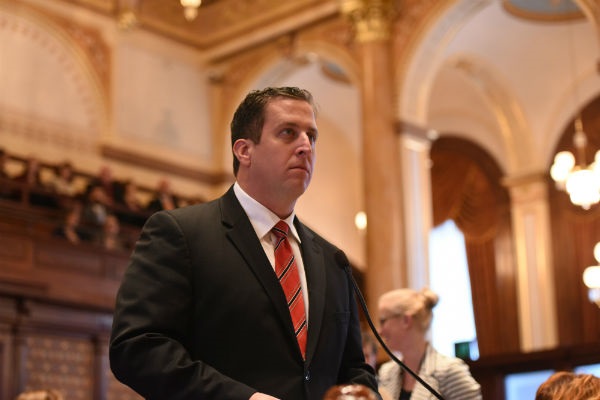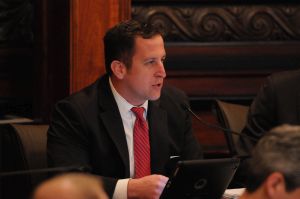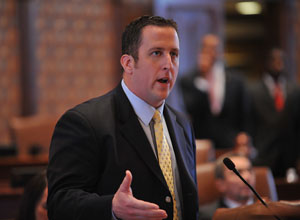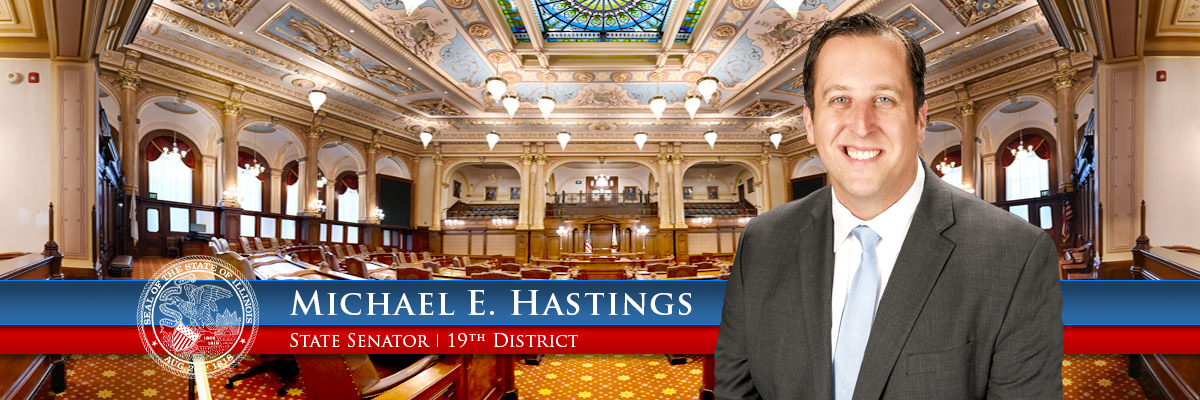- Details
- Category: Press Releases
 SPRINGFIELD – With gun violence reaching record levels and criminal justice reforms being debated in Springfield, Senate President John J. Cullerton tapped Senator Michael E. Hastings (D-Tinley Park) to lead the Illinois Senate Criminal Law Committee.
SPRINGFIELD – With gun violence reaching record levels and criminal justice reforms being debated in Springfield, Senate President John J. Cullerton tapped Senator Michael E. Hastings (D-Tinley Park) to lead the Illinois Senate Criminal Law Committee.
“I look forward to the challenge of leading the Senate Criminal Law Committee throughout the 100th General Assembly,” Hastings said. “Ensuring that our communities across the state are safe has always been one of my top priorities in the Illinois Senate.”
Hastings, a graduate of the United States Military Academy, served as a captain in Iraq from 2006-2007 during the period known as “the Surge.” Following his military service, Hastings went on to earn a master’s degree in business administration from the University of Illinois and a juris doctor from John Marshall Law School.
“Over the last four years, the Criminal Law Committee has tackled some very tough issues. Reducing penalties for cannabis, reintegrating ex-offenders into society, and bringing data driven approaches to law enforcement are no small tasks,” Hastings said. “Throughout the tenure of my service, it is my intent to improve the quality of justice throughout our state by enacting prudent policies.”
Hastings replaces the outgoing Senator Michael Noland (D-Elgin) who recently retired from the Illinois Senate in 2016.
- Details
- Category: Press Releases
 SPRINGFIELD – On Wednesday, the 100th General Assembly was sworn into office. Senator Michael E. Hastings (D-Tinley Park) joined his colleagues in taking swift action by implementing legislative leader term limits in the Illinois Senate. The new rule would limit a senator from holding the office of senate president or minority leader for only 10 years.
SPRINGFIELD – On Wednesday, the 100th General Assembly was sworn into office. Senator Michael E. Hastings (D-Tinley Park) joined his colleagues in taking swift action by implementing legislative leader term limits in the Illinois Senate. The new rule would limit a senator from holding the office of senate president or minority leader for only 10 years.
“This chamber receives its power through the people who put us in there,” Hastings said. “Every voice in the state should be heard and by implementing this we can help ensure that happens.”
The measure was adopted and Hastings hopes that the House will follow suit.
- Details
- Category: Press Releases
 SPRINGFIELD – Senator Michael E. Hastings (D-Tinley Park) on Tuesday advocated for the testing of water in schools and daycares that have children from preschool to fifth grade. Currently, there is no requirement for the testing of water.
SPRINGFIELD – Senator Michael E. Hastings (D-Tinley Park) on Tuesday advocated for the testing of water in schools and daycares that have children from preschool to fifth grade. Currently, there is no requirement for the testing of water.
“Seeing the conditions in Flint, Michigan and what people went through, we as a state must take proactive steps to protect our children,” Hastings said. “Our children are our greatest asset, we must protect them.”
The measure would also require that school districts notify the parents or legal guardians of all students if substantial amounts of lead are found in the drinking water.
“When we have problems with our drinking water, we need to be transparent about what steps are being taken to protect the children,” Hastings said. “This measure is both proactive and transparent so that parents can feel comforted that we are looking out for the well-being of their children.”
- Details
- Category: Press Releases
 MATTESON – Families throughout the 19th District were able to enjoy the holidays over the weekend thanks to an event hosted by Senator Michael E. Hastings (D-Tinley Park) and the Laynie Foundation in Matteson.
MATTESON – Families throughout the 19th District were able to enjoy the holidays over the weekend thanks to an event hosted by Senator Michael E. Hastings (D-Tinley Park) and the Laynie Foundation in Matteson.
The event hosted over 1,500 children, who all received a Christmas gift, and their families for the giveaway and a holiday meal.
“I was happy to join the Laynie Foundation in providing some holiday cheer in our community,” Senator Hastings said. “The holidays should be a joyous occasion for everyone and this event provided that for many children and their families.”
The Laynie Foundation is a non profit mental/behavorial health agency in Matteson, Illinois. The foundation is dedicated to providing services for youth and their families. Their mission is the pursuit of restoring mental balance through their specialized intensive outpatient program.
“Services like the Laynie Foundation are critical to our local communities,” Hastings said. “We as a state should continue to work with these groups to continue to provide excellent services throughout the State of Illinois.”
The community holiday giveaway was held on Saturday, December 17, 2016 at the Matteson Recreation Center.
More Articles …
Page 68 of 89


